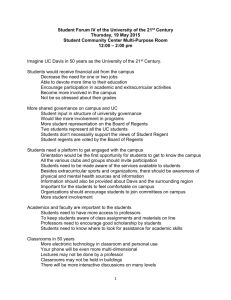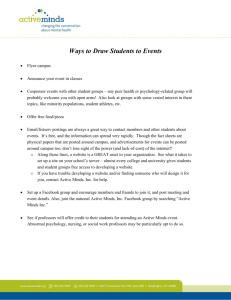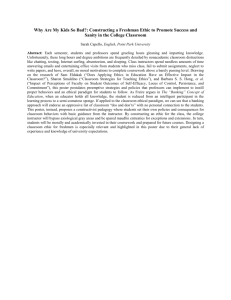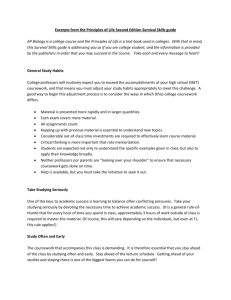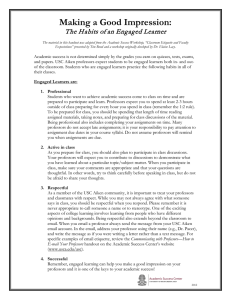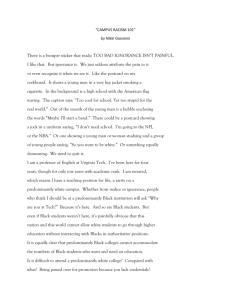Faculty Expectations and Tips - Northern Virginia Community College
advertisement
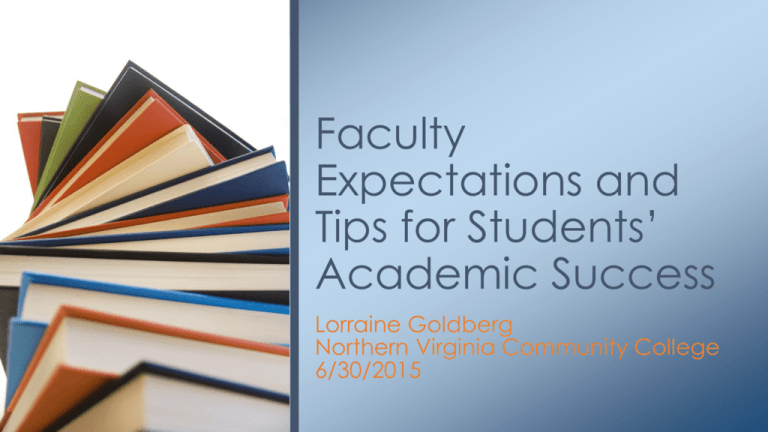
Faculty Expectations and Tips for Students’ Academic Success Lorraine Goldberg Northern Virginia Community College 6/30/2015 Welcome Parents! • Your support matters • Goals for today: – To explain faculty expectations of students – To provide best (and worst) practices – To share information about how parents can support their child’s learning Faculty Expectations: Ownership of Learning Process • Be familiar with academic calendar • Know locations of library, bookstore, writing center, testing center, cafeteria, coffee shop, student ID/tuition/parking, and adviser(s) • Walk class schedule & classrooms BEFORE start of classes • Study course content summary • Study course syllabus (paper/online) • Come to class alert, prepared, and ready to engage (note 1st assignment due 1st day of class) Faculty Expectations: Time Management • ADAPTABILITY TO PROFESSORS & COURSEWORK! – Full time and adjunct professors (approach to/availability for student support) – Interpretation of course content summary – Amount & type of assignments – Revisions/grading (A in high school = C in college); quality over quantity • 3 hours of homework for every credit hour in class • Analyze and follow directions • COMMUNICATE with professors = ask questions, share thoughts – Office hours! • Take advantage of extracurricular support • Campus engagement opportunities: academic & social Faculty Expectations: Professionalism • Behavior: be punctual, organized, responsive, and respectful – Be 10 minutes early to each class – Turn off the phone – Bring the course texts & assignments – Be respectful in writing (professional emails, typed assignments) – Be aware of course objectives and semester progress • Engage in class discussion – Academic debate vs. argument – Ask for assistance if shy/nervous Faculty Expectations: Best Practices • In general – Set a goal (graduation, transfer, career exploration, life skills) – OOH – Connect coursework to goals – Seek balance – Register for campus alerts – Find a brain trust • In class – – – – Don’t make assumptions about faculty expectations, ASK! Make recurring appointments for office hours Annotate! Annotate! Annotate! Front row seats = front row grades Worst Practices • In general – Treat NVCC as a commuter campus experience – Assume that gen eds don’t connect to upper level coursework – Lose track of the academic calendar • In class – Miss classes or be late consistently – Don’t ask questions (e.g. no book = no first reading) – Sit in the back row and remain silent all semester – Send informal emails to professors – Use cell phone during class time – Last minute requests for more work/revision/extra credit Your Support Matters • Success at CC more challenging than at 4-year institution – Competing responsibilities (work, family, bills, military service, etc.) – Off campus life (housing, meals, transportation, social pressures) – Onus is on students to ensure personal academic success • Prioritize the learning experience – Minimize/simplify other responsibilities/pressures – Set concrete rewards for academic success • Encourage ownership of the learning experience – Ask short answer questions – Be a sounding board, not a tutor/personal editor/back-up plan – Encourage critical thinking (cause/effect) Questions? Presentation available at http://blogs.nvcc.edu/lgoldberg/links/

